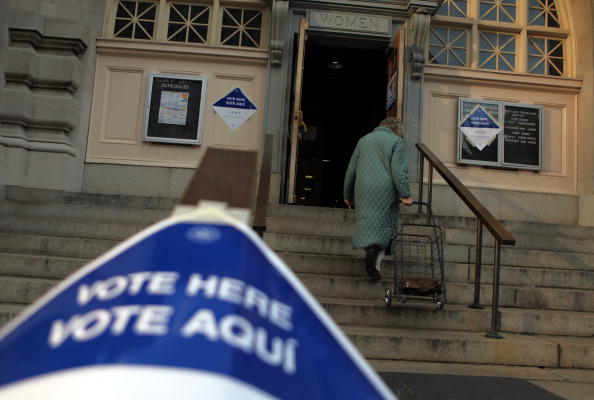Voters in majority-Latino Dodge City, Kansas, were directed to the wrong solitary polling place


A free daily email with the biggest news stories of the day – and the best features from TheWeek.com
You are now subscribed
Your newsletter sign-up was successful
Last week, Dodge City, Kansas — an iconic Wild West town (see: Gunsmoke) of 27,000 that is now 60 percent Latino — made national news because Ford County had moved the city's one polling location outside city limits, more than a mile from the nearest bus stop. Then on Thursday, Kansas election officials acknowledged that county officials had sent newly registered voters an official certificate directing them to the old polling location, a notification Kansas Director of Elections Bryan Caskey acknowledged was "confusing." Ford County Clerk Debbie Cox was instructed to try and clean up the mess before the Nov. 6 election.
"I didn't know this could get worse, and it did: 'Hey, let's move the site and not tell new registrants where they are supposed to go,'" Johnny Dunlap, chairman of the Ford County Democratic Party, told The Associated Press. Dodge City officials noted pointedly that moving the polling location out of town was a county decision, not a city one, James Fallows says at The Atlantic, and the city has organized free bus service to the polling location. (Lyft has also offered free rides.)
"Among city and county leaders there's concern many of the stories are missing some of those details, like the fact Dodge City has had only one polling location for decades," reports local ABC affiliate KAKE. "They say voters are used to the crowds running an expected 13,000 plus voters through one polling site will create." The city had multiple polling locations until 2002, AP reports, when the Americans With Disabilities Act imposed new accessibility requirements. Other polling locations in Kansas serve an average of 1,200 voters.
The Week
Escape your echo chamber. Get the facts behind the news, plus analysis from multiple perspectives.

Sign up for The Week's Free Newsletters
From our morning news briefing to a weekly Good News Newsletter, get the best of The Week delivered directly to your inbox.
From our morning news briefing to a weekly Good News Newsletter, get the best of The Week delivered directly to your inbox.
Since the Supreme Court weakened the Voting Rights Act in 2013, 868 polling places were closed nationwide, according to a 2016 report from the Leadership Conference on Civil and Human Rights. The top election official in Kansas, Republican Kris Kobach, is also running for governor this year; he is the nation's foremost proponent of restrictive voter ID laws.
A free daily email with the biggest news stories of the day – and the best features from TheWeek.com
Peter has worked as a news and culture writer and editor at The Week since the site's launch in 2008. He covers politics, world affairs, religion and cultural currents. His journalism career began as a copy editor at a financial newswire and has included editorial positions at The New York Times Magazine, Facts on File, and Oregon State University.
-
 The Olympic timekeepers keeping the Games on track
The Olympic timekeepers keeping the Games on trackUnder the Radar Swiss watchmaking giant Omega has been at the finish line of every Olympic Games for nearly 100 years
-
 Will increasing tensions with Iran boil over into war?
Will increasing tensions with Iran boil over into war?Today’s Big Question President Donald Trump has recently been threatening the country
-
 Corruption: The spy sheikh and the president
Corruption: The spy sheikh and the presidentFeature Trump is at the center of another scandal
-
 British warship repels 'largest Houthi attack to date' in the Red Sea
British warship repels 'largest Houthi attack to date' in the Red SeaSpeed read Western allies warn of military response to Iranian-backed Yemeni rebels if attacks on ships continue
-
 Houthi rebels claim Red Sea ship attacks
Houthi rebels claim Red Sea ship attacksspeed read Iran-backed Yemeni group vows to escalate aggression towards Israel-linked vessels in revenge for Gaza war
-
 Israel plans next phase of Gaza war as first hostages released
Israel plans next phase of Gaza war as first hostages releasedSpeed read After four-day ceasefire 'we will not stop' until destruction of Hamas, says Israel
-
 Mob storms Russian airport 'looking for Jews'
Mob storms Russian airport 'looking for Jews'Speed Read Plane from Israel surrounded by rioters chanting antisemitic slogans after landing in Russia's Dagestan region
-
 Tuberville's military promotions block is upending lives, combat readiness, 3 military branch chiefs say
Tuberville's military promotions block is upending lives, combat readiness, 3 military branch chiefs saySpeed Read
-
 Ukraine's counteroffensive is making incremental gains. Does it matter in the broader war?
Ukraine's counteroffensive is making incremental gains. Does it matter in the broader war?Speed Read
-
 US commissions first-ever Navy ship in a foreign port
US commissions first-ever Navy ship in a foreign portSpeed Read
-
 British spy chief, Wagner video suggest Prigozhin is alive and freely 'floating around'
British spy chief, Wagner video suggest Prigozhin is alive and freely 'floating around'Speed Read
